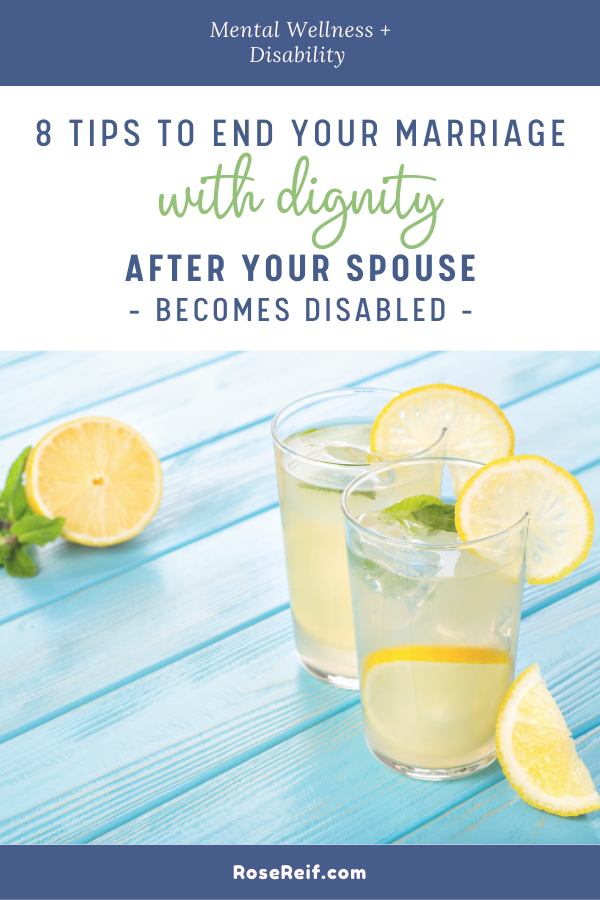The plans you’d made for the future all crumble away. Suddenly, your life feels like an endless stream of doctor’s appointments and therapy groups. It may feel like you know longer really know the person you’re married to, if their disability has changed their personality or behavior in profound ways.
Some couples navigate the challenges that disability brings successfully. They find ways to stay connected as partners and equals. Certainly, their daily routines and the roles they play in them may have completely changed. But these couples are able to maintain romantic partnership.
For others, however, it is not so simple.
Some disabilities have a profound impact on who a person is. Aside from what they can no longer do, their disability changes how they are able to be in a relationship. This can often be the case after stroke or brain injury. It may also be the case when one partner has a progressive disorder like Multiple Sclerosis.
In my counseling practice, I provide therapy to clients whose partners have become disabled.
Sometimes, they will recognize that they cannot remain in their marriage. They will say:
“I love her. I know she’s working so hard to get better. But she’s changed so much, and I don’t feel like I’m a husband anymore. I feel like I’m a housekeeper, and a nurse, and a chauffeur. On the really bad days, I feel like I’m just a babysitter. She looks the same, but she isn’t the same person anymore. I want to support her and care for her, but I don’t think I can stay married to her anymore.”
These partners want to maintain a loving, caring relationship to their partner. But defining that relationship as a marriage no longer feels right.
These caregivers recognize that, if they can stop holding themselves accountable to do all the things a spouse does, it may free them up physically and emotionally to be a better support to their disabled partner.
They recognize that, in order to keep loving and caring for their partner, they must end their marriage with dignity and create a new type of relationship.
It may feel impossible to end your marriage with dignity after your spouse becomes disabled
While there is often relief that accompanies this decision, there is also usually a lot of guilt and anxiety. There are also a lot of unanswered questions.
- How do we do this? Is it even possible to stay connected without being married?
- How can I help my spouse understand what is happening? What can I do to help make this easier for both of us? What should I say?
- Are there things I can do to be sure that my partner is cared for and supported, even if we are not married?
If you’re considering separating from your disabled spouse, you may have similar concerns. You may be wondering how to end your marriage with dignity after your spouse becomes disabled.
Read on to learn the eight tips that I share with my counseling clients who wish to divorce their disabled spouse with dignity.

1. Decide and agree on what your new relationship will be. Communicate this clearly based on your partner’s disability.
I once worked with a couple, let’s call them Tim and Andy. Andy had experienced a stroke, and with it came many personality changes. He was prone to angry outbursts when he couldn’t remember something. Because the stroke affected his short-term memory, this happened frequently.
Initially, Tim told Andy that he wanted to end their romantic relationship, and Andy said he understood. But then, multiple times each day, he would act as though he’d forgotten. Or he would ask why Tim didn’t want to be his husband anymore. Tim felt exhausted and devastated having to revisit the conversation and re-establish his boundaries nearly daily.
When I met with them, I pointed out to the couple that, prior to the stroke, Andy would have had no trouble integrating and remembering new information that was presented verbally. But, the stroke and changed his memory, and made this much more difficult for him to do.
I encouraged Tim to present the information to Andy in writing. This, I explained, would give Andy more independence in understanding the decision when his memory failed him. Rather than have to go to Tim every time he questioned what was happening and why, he would instead be able to review what Tim had written him. I also pointed out that this would save Tim the pain of having to restate what was happening so frequently.
And so, Tim wrote Andy a clear, loving letter. The letter explained that Tim felt he was married to someone who was no longer his partner. Tim let Andy know that he cared for him and loved him, but that trying to maintain a marriage was causing him stress and anguish. He explained his hope, that ending their marriage would allow him to be a better friend and supporter of Andy. He explained that spending less time together allowed the time that they did spend together to be more fun and meaningful. Andy read and re-read the letter every morning while he drank a cup of coffee. After a few weeks, he stopped questioning the reasons for the divorce. Soon after, he was able recognize the improvement in the quality of the time that he was spending with his ex-husband.
If you are in the same position as Tim, I encourage you to consider how you may communicate the changes in the relationship not just verbally, but also in writing, or with other visual aids. This may help both you and your former partner.
2. Use the right words, and use them consistently
Agree on the words you’ll use to describe your relationship and each other. Be intentional about using these words consistently when you speak with your partner. But don’t insist or push that your spouse begin using the new words immediately. Allow your spouse time to process their grief and to acclimate to the change.
Some examples of language shifts that may be helpful and necessary:
- How you’ll describe each other. If it no longer feels right to refer to your former partner as your spouse/husband/wife, you may consider calling them “my person”, “my champion”, or “my best friend”. One former client used to describe “he used to be my husband, but now he’s my favorite family member. He’s just my David.”
- How you’ll talk about the places you each live. It can be confusing and cause additional grief to continue to call what used to be your family home “home”. Some people will begin to refer to the house by the street name, or by the color of the house.
“I’ll pick you up at the Blue house”
“I’ll pick you up at the Coriander Drive house”
You might also simply say:
“I’ll pick you up at your house”, or “let’s meet at my house”.
These language adjustments, and agreeing on them, is especially important if you have children together. They will help your children to acclimate to the changes in the relationship.
3. Finding new ways to signify your new relationship
The couples I’ve supported through divorce have found many unique ways to physically represent the change in their relationship.
One couple began wearing their wedding rings on chains as necklaces. Others have put their wedding rings away and picked out new jewelry to wear that signifies their new relationship to one another.
Some couples have purchased artwork or candles, one for each of them to have in their individual homes, that signify their changed relationship.
Finding a meaningful way to outwardly signify the change in your relationship can serve as an additional visual aid to give your former partner a reminder about the change in the relationship.
4. Ensure the safety of the disabled partner
One of the main concerns often raised by the person who is leaving a disabled partner is ensuring the safety of the former spouse.
I encourage couples to work together to find security solutions that help everyone to feel comfortable.
Of course, it is also important to consider your former partner’s abilities as you help them make decisions about their safety and security.
For instance, suppose your former partner struggles with memory or fine motor skills since their disability. If your former partner has these challenges, they may be frequently losing the keys to their home, causing them to be locked out. Or, they may have so many spare keys, or may have hidden them in so many places, that they risk someone finding them and being able to enter their home. Of course, for many people who have become recently disabled, using a turn key poses a physical challenge. For any of these situations, changing the home’s entry system to a biometric one, such as one that uses only the person’s fingerprint like the one below, reduces much of the risk and hassle.
Some partners like to make use of smart systems like Amazon’s Alexa, so that the disabled partner can use the ‘drop in’ feature in moments of need.
Many couples also consider whether a dog could do double duty as both a security guard and a service animal. You can read this post to learn more about service animals, and how to decide if getting a service dog could be right for you.
Lastly, if you recognize that there are safety or physical needs that aren’t being met, you may want to consider hiring a personal care aide to support your former spouse.
5. Build a community around the disabled partner
When you were married, you had each other to turn to for advice and reassurance. With the change in your relationship, it makes sense that you might want to expand the network of support available to the disabled partner. This will give them additional people to turn to for support in making big decisions.
Working together, identify 5-10 people who are trustworthy, reliable, and devoted to the success of the disabled person. These might be:
- Family members
- Friends
- Neighbors
- Members of a spiritual community
- Former co-workers, supervisors, coaches, etc.
The disabled partner should have full awareness and agreement as to who is included in their support group, and what the roles of this group are.
I usually recommend that this group agree to meet at least 4 times a year, and more often if needed. Ideally, this meeting would happen with at least some group members visiting the home of the disabled individual. This can be an extra layer of assurance to be sure that their physical and safety needs are met, and that they are managing living independently and don’t need any additional supports.
The group should have a clear sense of what the person’s goals are for themselves, and provide accountability and support to assist with meeting them.
6. Anticipate difficult days
While there can be many benefits to ending a marriage that is no longer a viable romantic partnership, it is natural that your disabled former spouse may have some days when this feels wrong, or causes them additional grief.
This may be especially true on significant days, like your anniversary, or the day of your divorce, your birthday or theirs, holidays, etc.
Invite your former partner to talk about how they would like to spend these days. Perhaps they would like to adapt old traditions to reflect how your relationship has changed.
For instance, one separating couple I supported had previously watched their wedding video together on their anniversary. After some thought, they realized they wanted to continue to do something to commemorate their anniversary, but knew that watching their wedding video didn’t feel right, since they were no longer married. Ultimately, they settled on having dessert together and dancing to “Aint No Mountain High Enough”, which felt like a perfect reflection of how their relationship had changed.
Know that it is not wrong for your partner to experience and express more intense emotion on these significant days. If you can anticipate these days, encourage your former partner to work with you and their support network to ensure that they won’t feel isolated or abandoned on these tough days.
7. Be consistent in your new commitment
It is understandable that you want to support for your former partner as your relationship changes. But be careful that you don’t over-commit yourself. Be clear with your former partner about when and how you will see or otherwise interact with them. Then be consistent in meeting those obligations.
Say, for example, you agree that you and your former partner will have dinner together every Tuesday night. If a work obligation comes up one Tuesday night, don’t assume that it will alright to skip a week. Let your former partner know and ask them if they would prefer to reschedule or to skip the week. Giving them this degree of choice and input lets them know that their happiness and your commitment to them still matter deeply to you.
8. Document what matters
It’s very likely that changes in your partner’s memory, personality, or other cognitive changes are a main reason why you need to end the marriage. Support your partner’s changed cognitive abilities by giving them visual and written prompts to remember key information about the changes that are happening.
One couple I supported through divorce had previously shared a car. After separating, they realized they needed two cars. The disabled partner wanted a new car. However, a week later, she called her husband very confused and upset, saying she could not find her car. When he arrived at her home, he realized that she had forgotten what had happened, and was looking for the old car. She didn’t recognize or remember that the new car parked in front of the home was hers.
Ultimately, I encouraged this couple to create a book that documented major life changes since the wife became disabled. She learned that, if she was confused or frustrated by something, she should look in the ‘reminder binder’ to see if an explanation was included.
Summary
Ending a marriage to someone you still have love and care for is a difficult thing to consider, and even more difficult to do.
But sometimes finding a new relationship, one that isn’t marriage, allows both people to flourish and keep a strong connection after one of them becomes disabled. Know that this isn’t the end of your relationship, rather, it marks a turning point that has the potential to benefit you both.
There is not one right or wrong way to make this change. Some couples continue to vacation together, and others don’t. Some have regular date nights, while others limit their interactions to phone conversations. The only choices that are right are the ones that you and your former partner agree to. And they don’t have to make sense to anyone else.











